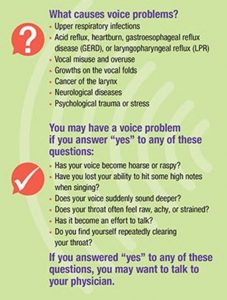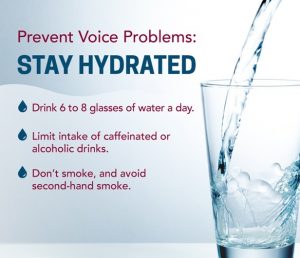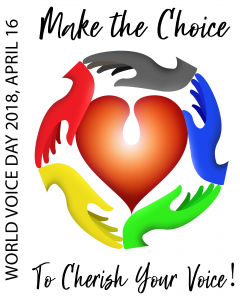The voice is more important than ever-in school, on the job, and for social interaction. But many abuse their voice by smoking, shouting, drinking, or poor speaking technique. When problems occur, treatment is often ignored, leading to more significant problems.
To address this, World Voice Day was established as a special day of awareness, recognition, and celebration of the human voice. Each year on April 16th, we commemorate The Voice. This year’s theme is, ”make the choice to cherish your voice.”

Voice changes sometimes follow an upper respiratory infection lasting up to two weeks. Typically the upper respiratory infection or cold causes swelling of the vocal cords and changes their vibration resulting in an abnormal voice. Reduced voice use (voice rest) typically improves the voice after an upper respiratory infection, cold, or bronchitis. If voice does not return to its normal characteristics and capabilities within two to four weeks after a cold, a medical evaluation by an ear, nose, and throat specialist is recommended.
Others include reflux, growths in the voice box, muscle or nerve weakness or cancer.

You can cherish your voice by making these healthy choices:
- Drink plenty of water each day
- Limit coffee, caffeinated tea, and soda
- Avoid vocal overuse and abuse
- Quit smoking, avoid the use of smokeless tobacco, and limit exposure to secondhand smoke
- Treat associated acid reflux
- Manage stress appropriately

To create a voice, conversational, singing or professional, 3 critical elements are required.
- The power source-your lungs. The power for your voice comes from air that you exhale. When we inhale, the diaphragm lowers and the rib cage expands, drawing air into the lungs. As we exhale, the process reverses and air exits the lungs, creating an airstream in the trachea. This airstream provides the energy for the vocal folds in the voice box to produce sound. The stronger the airstream, the stronger the voice. Give your voice good breath support to create a steady strong airstream that helps you make clear sounds.
- The vibrator-your voice box. The larynx (or voice box) sits on top of the windpipe. It contains two vocal folds (also known as vocal cords) that open during breathing and close during swallowing and voice production. When we produce voice, the airstream passes between the two vocal folds that have come together. These folds are soft and are set into vibration by the passing airstream. They vibrate very fast – from 100 to 1000 times per second, depending on the pitch of the sound we make. Pitch is determined by the length and tension of the vocal folds, which are controlled by muscles in the larynx.
- The resonator-your throat, tongue, nose, teeth and lips. By themselves, the vocal folds produce a noise that sounds like simple buzzing, much like the mouthpiece on a trumpet. All of the structure above the folds, including the throat, nose, and mouth, are part of the resonator system. We can compare these structures to those of a horn or trumpet. The buzzing sound created by vocal fold vibration is changed by the shape of the resonator tract to produce our unique human sound.

An occupational or professional voice user is anyone whose voice is essential to their job. We are all accustomed to thinking of singers, actors, actresses, and broadcast personalities as professional voice users. Teachers, clergy, salespeople, courtroom attorneys, and receptionists are also people for whom spoken communication is an essential part of what they do, and there are countless other professions that rely heavily on the voice.
Voice is something that is often taken for granted. Many people, including many occupational voice users, don’t pay attention to their voice until they develop a significant problem with it. These voice problems then have an adverse effect upon their ability to do their job.
As with many ailments, awareness is key. First, people must be made aware of voice-related occupations.
Secondly, being a professional voice user places you at greater risk for developing vocal difficulties, and that you have to listen to your own voice in order to recognize when you are developing problems. Do not accept hoarseness as part of the job.
Finally, know that proper evaluation and treatment can take care of most voice-related problems, and can set you up to succeed at even the most demanding voice-related occupation. Seek out your Ear, Nose and Throat Doctor for an evaluation and treatment recommendations.
Get an appointment with one of our Ear, Nose and Throat Surgeons and depending on your location:
- Nairobi ENT Clinic, Nairobi Hospital, Anderson Centre, 2nd Floor. info@nairobientclinic.com
Tel: +254 (020) 272 0480 | +254 (020) 271 0068
Mobile: +254 (0)721 391465 | (0)733 633667 - Aga Khan Hospital Clinic, Doctors’ Plaza, Room 110 (1st Floor) – 0721 391404 / 020-3746889 / 3662715
- Kisumu Clinic, Mega City Building. 0701 562301 / 057-2020438
- Greenspan Mall Clinic, Donholm, 2nd Floor. 0725 021315 / 0788 204504
- Nairobi South Hospital (South C) Mezzanine Floor, Room 5. 254 (0)721 391465 | (0)733 633667

